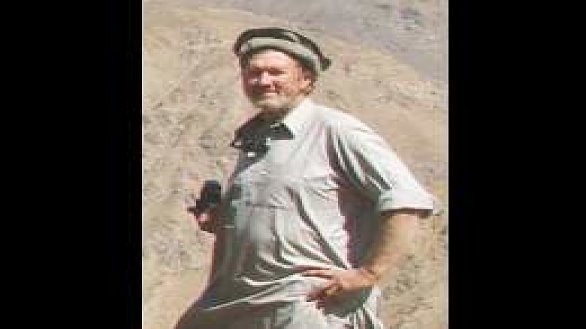SEQUIM, Washington -- Dan Terry, one of 10 members of a medical aid team brutally murdered last week in Afghanistan, was a member of the men's Bible Study group at Trinity United Methodist Church in the state of Washington.
While on leave, he gave a special presentation at the Bible study group, and frequently talked about his life's work of helping needy Afghanis. He organized a celebration of life for his parents George and Pat who died after serving as missionaries in Afghanistan.
Terry's death, one of six Americans in the team led by Tom Little, 62, of Delmar, N.Y., was announced during a church services.
The 11 were killed in cold blood as they knelt next to their Land Rovers after having lunch in a remote corner of Afghanistan.
The Taliban has taken credit for the killings, saying the medical team was promoting Christianity in the Muslim nation -- which the sponsoring medical aid organization denies.
Terry, 64, had performed relief work in Afghanistan since 1971, following in his parents' footsteps.
He was joined in Afghanistan by his wife, Seija, a retired nurse, and they raised children there.
"I heard the news about the Americans being killed, and I immediately thought of Dan," said Bill Gordon, pastor of Trinity United Methodist Church, on Monday.
"It just broke my heart."
Gordon said he knew Terry for only three years, but he "considered him a friend."
"He was here until Christmas and then was on East Coast until he went back to Afghanistan," Gordon said.
"People here knew him and loved him, both he and [wife] Seija. My heart just breaks for Seija."
Gordon said Terry and his wife gave a special presentation of their humanitarian work, and church members financially supported their cause.
The pastor said when he returns from vacation in two weeks, he hopes to talk to church members about holding a special service in memory of Terry.
"I suspect we'll do something at some point, but we'll have to hear from Seija," he said.
Church secretary Marian Needham, who helped Terry set up a memorial service for his parents at the church in August 2009, remembered Terry's charitable efforts.
"He would work to help people dig wells and improve the conditions of life in Afghanistan," said Needham, who still has the thank-you note from Terry, with a photo of him with his sister, mother and father.
"It's so sad because these people along with Dan were all trying to help and improve the lives of people there."
Jim Davis, who led the Trinity United Methodist men's Bible study group that Terry joined when he was in Sequim on leave for a month to six weeks at a time, said he and others in the congregation were stunned upon hearing the news of Terry's death during the Sunday service.
We "gather in the kitchen at the church and talk for an hour," Davis said, recalling that Bible study session when Terry joined the group.
"As far as joining in on the conversations with the studies, he was always willing to talk. I thought he was a very good man, and I couldn't see how he could be anybody's enemy."
Davis called Terry "Mr. Fix-it," a reference to the repair skills Terry inherited from his father, George, a missionary originally in India who was transferred to Afghanistan when Terry was a teenager.
Terry "knew Afghanistan like the back of his hand," Davis said.
"That was his life over there. That's all he's ever done, and he was good at it."
Davis' wife, Diane, described Terry as "a very compassionate person and very dedicated to what he was doing. He was doing what he really believed in doing."
Dan Hofmann, a member of Bible study group, recalled Terry as "a phenomenal person. He said he felt like the church was his home base."
Hofmann remembered when Terry announced he was facing two choices: to go back to Afghanistan or remain in Sequim to recuperate from knee surgery.
Terry had just recovered from that knee surgery and reportedly had looked forward to hiking over a 16,000-foot Afghan pass to reach a remote valley, providing eye care and other medical services.
Although the Taliban claimed responsibility for the killings, some Afghani officials suspect common criminals carried out the attack.
It was the biggest assault on foreign Christians since the 2007 kidnapping of 23 South Korean missionaries, two of which were slain by the Taliban in Ghazni province.
The survivor of last week's attack, a driver named Saifullah who had worked for the humanitarian group for four years, was flown to Kabul on Sunday from Badakhshan province.
Also taken to the capital were the bodies of Terry and the five other Americans, two Afghans, a Briton and a German who were shot to death after finishing the two-week medical mission treating Afghan villagers in the remote Parun valley of Nuristan province.
Terry was being remembered by Global Ministries for the United Methodist Churches at http://new.gbgm-umc.org where Thomas Kemper, chief executive of Global Ministries said in a statement:
"It is almost beyond belief that Dan Terry would be murdered in Afghanistan. He loved the country with a passion and worked tirelessly on behalf of its most marginalized communities.
"He was fluent in multiple regional languages and was expert in helping the staff of international nonprofit organizations understand and respect the culture."
The Rev. Bruce Griffith, a friend of Terry's and executive with Global Ministries, said:
"He was a United Methodist gift to the humanitarian cause in a country that has known bloodshed and pain for decades.
"He represented hope, peace, justice, and compassion.
________
This article is adapted from an article in the Pennisula Daily News by Jeff Chew
The photo of Dan Terry is from the Associated Press


